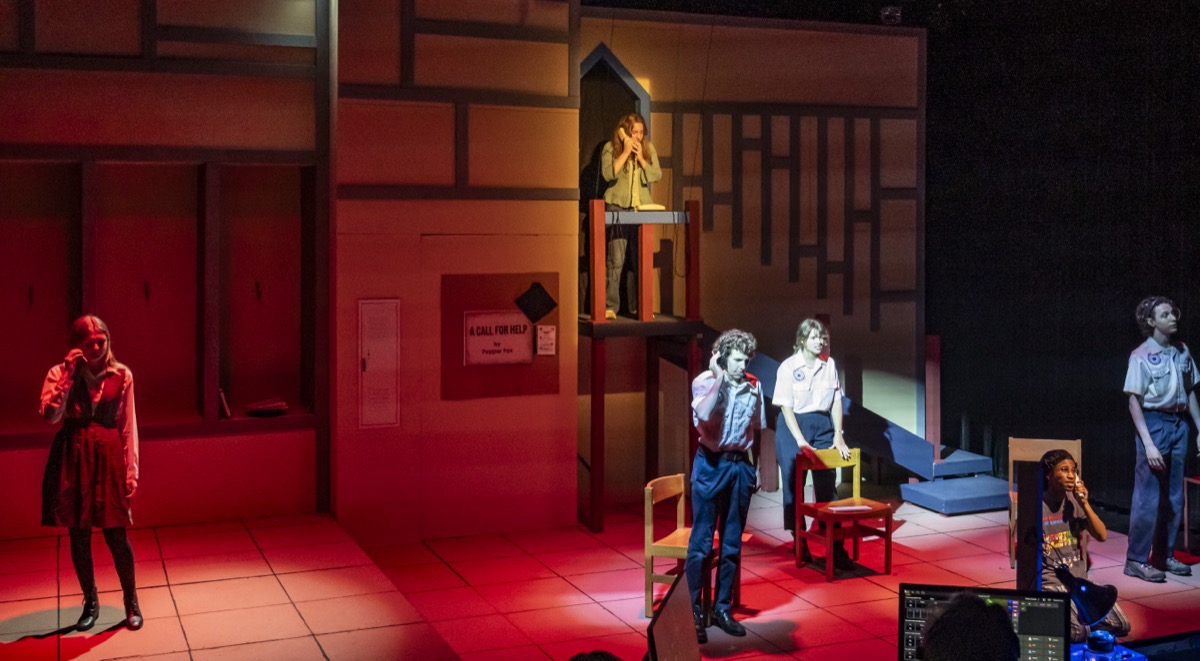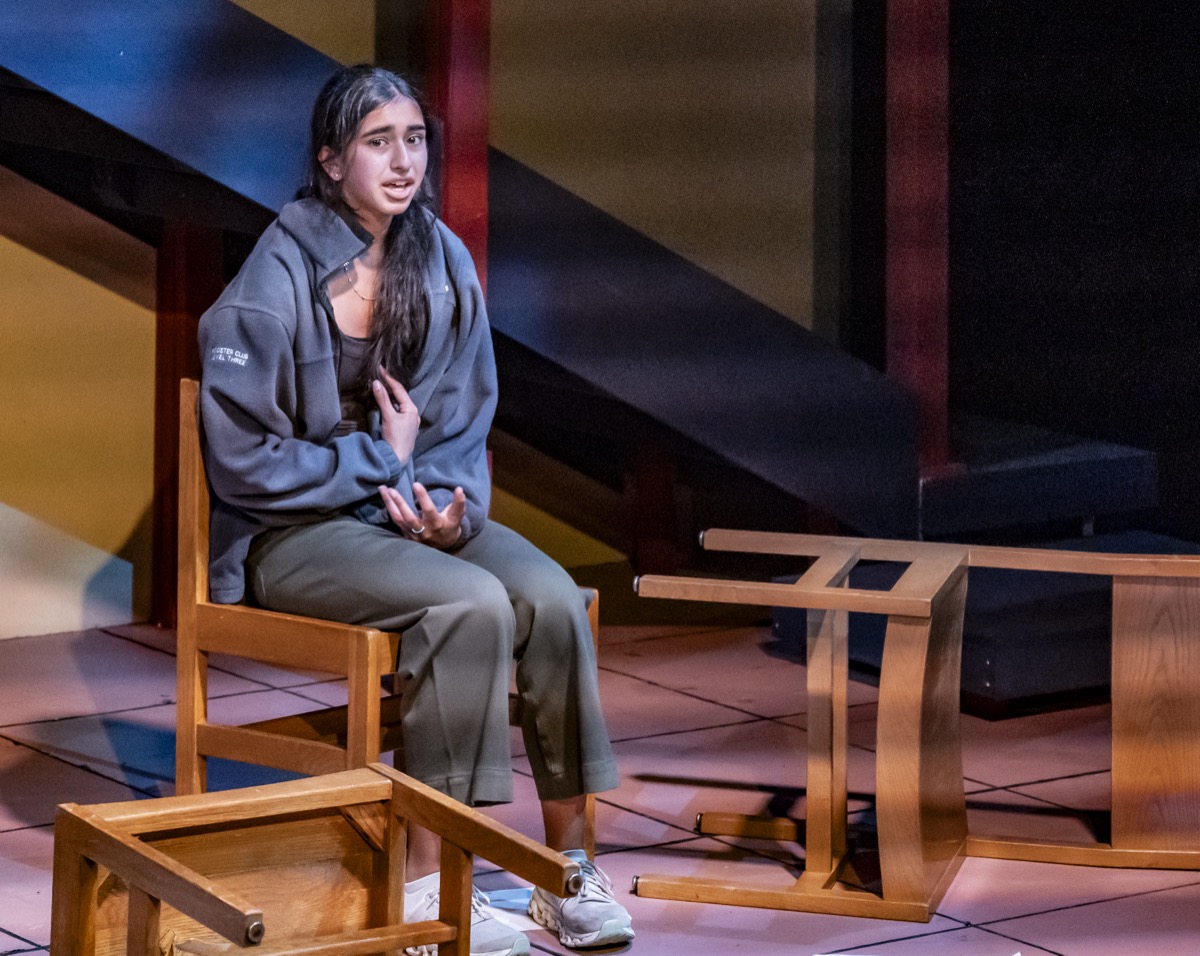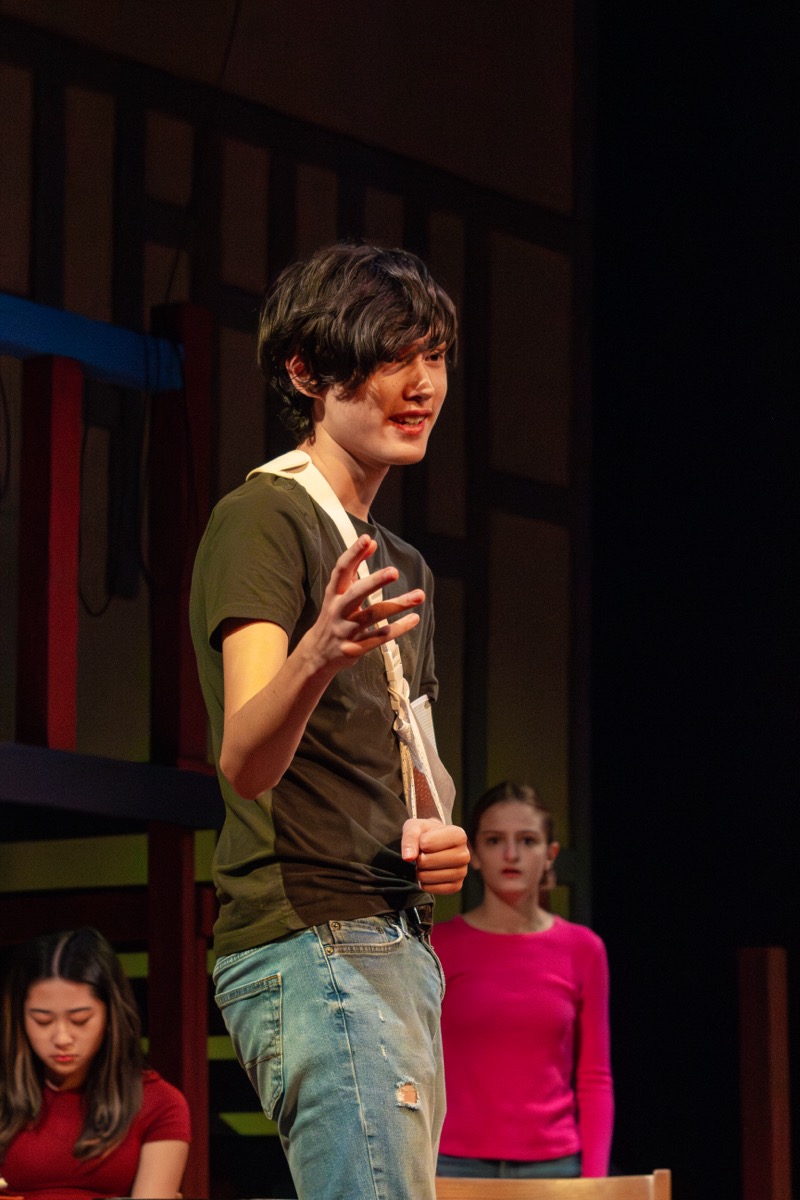Last weekend, the MICDS Upper School theater program presented a groundbreaking production in the Vincent Price Theatre of ENOUGH: Plays to End Gun Violence – TRIGGER WARNING, a series of six one-act plays that speak to the stories of victims of gun violence.
Upper School Fine & Performing Arts Teacher Patrick Huber said, “Last year, I was introduced to a project called Enough: Plays to End Gun Violence. High school students from across the country write and submit one-act plays. The prompt includes this challenge: What if…You wrote a play about gun violence without showing a gun and without showing any violence? What kind of play would YOU write?”
Seven of the submitted plays were selected for a staged reading in cities across the US by a panel of industry-leading playwrights, dramaturgs, directors, and producers. The selected plays are then published by Playscripts, Inc. and offered for production. Last summer, Playscripts began licensing all three annual editions of the Enough plays. This gave the MICDS Theater Department 21 plays to choose from, and with the leadership of our Thespian Society members as directors, the students and faculty put together a powerful show from these scripts.
The production included the following plays:
- Undo, Redo by Cameron Thiesing, directed by Lilia Oulamine ’26
- It’s Okay by Anya Jiménez, directed by Cam Cozad ’27
- A Call for Help by Pepper Fox, directed by Katherine Rose Ellenhorn ’26
- Lightning Strike by Amanda Fagan, directed by Carrie Clennan ’26 and Taylor Nuzum ’26
- Guns in Dragonland by Eislinn Gracen, directed by Grace Powell ’26
- Write Their Wrongs by Wyn Alyse Thomas, directed by Lainie Zimmer ’26
Scenic, sound, lighting, and costume design added to the potency of the production:
- Scenic Design by Lola Compton ’27 and Catherine Dawson ’26
- Lighting Design by Max Charnond ’25
- Sound Design by Meredith Mack ’26
- Costume Design by Ava Casillas ’26, Natalie Benoist ’25, and Samantha Sullivan ’25
View the complete program here.
“The MICDS Mission states, More than ever, our nation needs responsible men and women who can … embrace all [the world’s] people with compassion. None of our students know what it was like to hear about the Columbine shooting in 1999,” said Huber. “It seemed unthinkable at the time. Since then, it has been normalized, and the stories we are confronted with of victims of gun violence have multiplied and overwhelmed us. Active shooter drills are now part of every student’s life.
“More than ever, we can’t look away as the victims of gun violence accumulate. We can change the world, but empathy for those among us who are suffering is an important condition of that agency. Theater, especially in the form of the voices of young writers, directors, and actors, has always been one of the most effective therapies for developing empathy.
“In producing this show, our goal was to authentically tell the stories of victims of gun violence, including those who are killed or injured, those who are left behind, and those who work to help them. We’re calling our production of these scripts Trigger Warning, both because the mechanism that precipitates gun violence is the trigger, and because the audience must be aware that we confront the consequences of gun violence, and those consequences are not easy, even in the form presented here.”
Due to the strong language and references to violence, trauma, and self-harm, the actors and production members held a talkback after each performance to integrate the thoughts, insights, and impact of the show.
Taylor Nuzum ’26 said, “I knew that I wanted to direct after participating in The Good Doctor one-acts last year. I was immediately drawn to my scene with Carrie, Lightning Strike, because the protagonist had the same name as my sister, Hallie, and I found the writing to be very inspirational and emotional. Some challenges we encountered came during casting, as Carrie and I had trouble deciding whether we wanted to cast four different people or a single actress for the role, but we ultimately decided to only cast Narya [Phatak ’26] based on her powerful performance. I’m most proud of how Narya, Carrie, and I worked together to make the piece feel so natural, considering this was the first time it was ever staged. In my opinion, the most important takeaway from the production was learning the importance of working together as a cast to support each other, because acting as a traumatized character can be very damaging.”
Cam Cozad ’27 directed It’s Okay and said, “I felt like it was an important show and I needed to be a part of it.” What he didn’t expect was having to step in for one of his actors at the Saturday night performance. “Mr. Huber came up to me maybe two minutes before the show started and told me my actor was sick and had to leave. I had to play a character for the first time on stage. It was scary, but I appreciated being more involved than just directing,” he said.
“I was inspired to direct the plays because for a lot of my life I have been on stage,” said Carrie Clennan ’26. “Whether it is acting in class with Ms. Hood, receiving direction in Price or Orthwein, or singing at Blue Whale, I have always loved to perform and share my passion for art with others. However, I realized that I had never known what it was like to be on the other side, creating art as a director instead of the vessel in which the art was produced. I thought it would be a really cool experience to direct a play to see what it’s like from the other perspective.
“One of the challenges that I was a little concerned about initially was that our actress, Narya, had never been on stage before. However, we were able to completely work through it because she has so much perseverance and is a quick learner. Taylor and I were able to give her notes and instructions that she almost immediately implemented, and by using good communication and honesty, I think we were able to pull off a really great actor-director relationship. Additionally, being a first-time director and only being 17, it was challenging at times to gain the complete attention of the room and quiet down the cast, but I figured out that treating them respectfully while also being clear about my expectations was the key to success.
“I think an important takeaway from the production is that trauma can affect any and all people, and it is important to recognize that issues that have happened in the past are still prevalent in the present. As a director, I realized that it is important to lead with a balance of empathy and bluntness, of kindness and also firmness. I am most proud of how smoothly everything went and how well the cast and crew all got along,” she added.
Huber said, “We had large and attentive audiences for all of the performances, which makes me proud of the MICDS community for considering this difficult but important subject. I am humbled by the courage of the student artists who created this production, and by their trust in me by investing themselves so thoroughly.”
























































